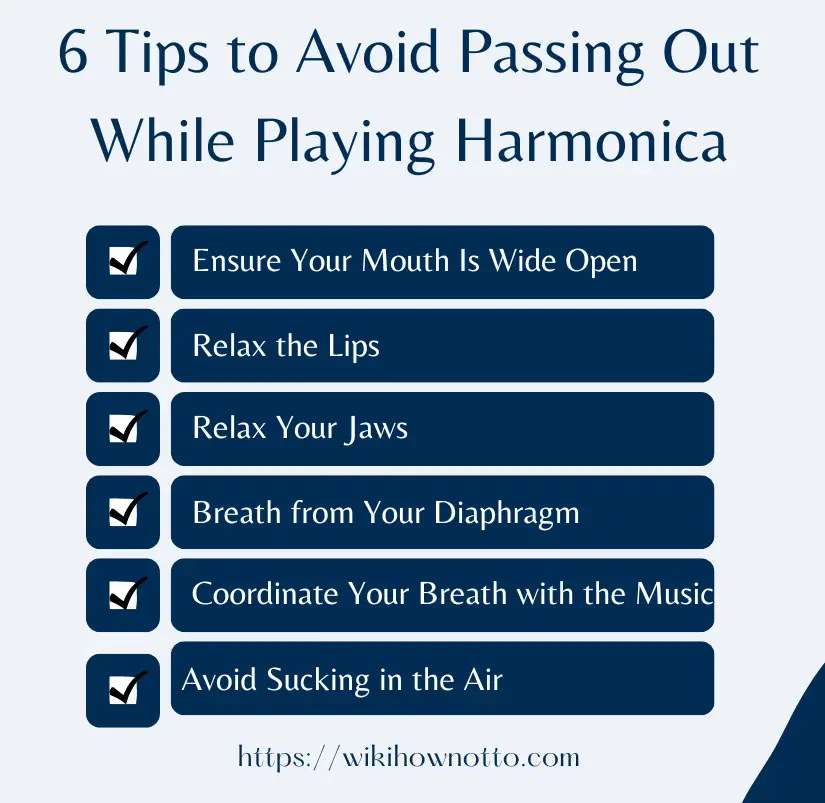Music is medicine to our soul and can help us not fall into depression. But how often have you started playing the harmonica and felt lightheaded and dizzy? If you’re like most people, it’s probably happened more than once. Due to a lack of oxygen getting to your brain, passing out while playing the harmonica is a real danger.
Harmonica is a small, portable instrument you can take anywhere. Unfortunately, this also means more opportunities to pass out while playing.
What Can Cause Passing Out Playing Harmonica?
If you have Chronic obstructive pulmonary disease (COPD), it can be strenuous to play harmonica at first. This is because these diseases make it difficult to get enough oxygen to your lungs.
In addition, if you play the harmonica for long periods without taking a break, you may feel lightheaded and dizzy. This is because you’re not getting enough oxygen to your brain.
Your breathing technique when playing the harmonica can also contribute to passing out. If you suck in air instead of breathing from your diaphragm, you may not get enough oxygen to your lungs. This can make you pass out.
Some songs require heavy breathing, which can also lead to passing out. If you play a song that requires high intake, take breaks often and breathe from your diaphragm.
How to Avoid Passing Out Playing Harmonica (6 Easy Steps)
Highlighting the problem is one thing, but what can you do to avoid passing out while playing the harminica?
Here are 6 easy steps:

1. Ensure Your Mouth Is Wide Open
When you play the harmonica, ensure your mouth is wide open to cover holes 1-4. This makes it easy to harmonize your breathing with the music without straining yourself.
The wider your mouth is, the more oxygen you’ll take in with each breath. This will help prevent you from passing out.
2. Relax the Lips
Pursing your lips too tightly while playing the harmonica can restrict airflow. This makes it difficult to get enough oxygen to your lungs.
The innermost part of your lips should cover the cover plates in the harmonica. The rest of your lips should be relaxed to allow air to flow easily.
3. Relax Your Jaws
How do you hold the harminica in your mouth? If you’re clenching your jaws, it can result in less oxygen getting to your lungs. Relaxing the jaws gives you more space to breathe and prevents passing out.
4. Breath from Your Diaphragm through the Mouth
The diaphragm is a muscle located between your chest and stomach. It controls your breathing. When you breathe from your diaphragm, it moves down and expands your chest cavity. This allows more air to enter your lungs.
To breathe from your diaphragm, place one hand on your stomach and the other on your chest. As you inhale, focus on expanding your stomach. You should see your stomach expanding, not your chest.
This type of breathing is more efficient and will help prevent you from passing out while playing the harminica.
5. Coordinate Your Breath with the Music
Coordinating your breath with the music is key to not passing out while playing the harmonica. This means taking a breath when there’s a break in the music.
For example, if you’re playing a song with eight bars, take a breath after the fourth bar. This will ensure you’re getting enough oxygen in your lungs.
You can also take a breath every two bars if you’re playing a fast-paced song.
6. Avoid Sucking in the Air
There is a difference between breathing and sucking in air. Although this is not easy, you need to avoid sucking in the air while playing the harmonica.
This is because when you suck in air, it goes into your stomach instead of your lungs. Breathing naturally through the music requires constant practice to avoid passing out.
Conclusion
Passing out while playing the harminica be caused by various factors. However, there are things you can do to prevent it from happening. Whether you are an amateur or a professional, you can train yourself to not pass out by learning how to breathe properly. In addition, ensure your mouth is wide open, relax the lips, and avoid sucking in the air while playing the harmonica. These tips will help improve your overall performance and keep you from passing out.